| The Joint Mathematics Meetings are
held for the purpose of advancing mathematical achievement,
encouraging research, and to provide the communication necessary
to progress in the field. These meetings serve to preserve,
supplement, and utilize the results of the research of mathematicians
the world over. Keeping abreast of the progress in mathematics
results in the furtherance of the interest of mathematical scholarship
and research. |
Special Event on the Poincaré Conjecture
and Geometrization Theorem CANCELLED
We regret that the special event on
the Poincaré Conjecture and Geometrization Theorem
has been canceled. It became apparent that the continuing
controversy was undermining this special event.
|
Lax to Deliver Gibbs Lecture
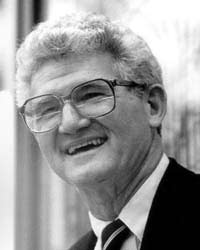 Peter
D. Lax, New York University-Courant Institute, will deliver
the AMS Josiah Willard Gibbs Lecture on Friday January 5, 2007 from
8:30 p.m. to 9:30 p.m. He will speak on Mathematics and Physics.
The lecture will be held in Grand Ballroom A, B, C, Sheraton
New Orleans Hotel. Peter
D. Lax, New York University-Courant Institute, will deliver
the AMS Josiah Willard Gibbs Lecture on Friday January 5, 2007 from
8:30 p.m. to 9:30 p.m. He will speak on Mathematics and Physics.
The lecture will be held in Grand Ballroom A, B, C, Sheraton
New Orleans Hotel.
Peter D. Lax is Professor Emeritus of Mathematics
at Courant Institute of Mathematical Sciences, New York University.
He was born in Budapest, Hungary on May 1, 1926. He emigrated to
New York with his parents in 1941, and subsequently received his
B.A. (Mathematics) in 1947 and his Ph.D. (Mathematics) in 1949 from
New York University. In 1950, Lax went to Los Alamos for a year
and later worked there as a consultant, but by 1951 he made his
academic home at New York University, where he has undertaken his
life's work at the Courant Institute (and where he served as director
from 1972-1980). He became professor in 1958.
Professor Lax's interests focus on fluid dynamics,
partial differential equations, and computation.. He laid the foundations
for the modern theory of nonlinear hyperbolic conservation laws
and has made fundamental contributions to numerical methods for
partial differential equations. His name is connected with many
major mathematical results and numerical methods.
Professor Lax is a member of many learned
organizations. He has received honors too numerous to mention. He
was the SIAM von Neumann Lecturer in 1969, the Hermann Weyl Lecturer
in 1972, and the MAA Hedrick Lecturer in 1973.
He served as President of the AMS from 1979
- 1980.
Bona to Speak on Big Waves in Deep Water
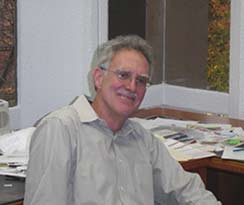 Jerry
L. Bona, University of Illinois
at Chicago, will deliver an MAA Invited Address on Monday January
8, 2007 from 10:05 a.m. to 10:55 a.m. He will speak on Big
waves in deep water. The lecture will be held in Grand Ballroom
A, B, C, Sheraton New Orleans Hotel. Jerry
L. Bona, University of Illinois
at Chicago, will deliver an MAA Invited Address on Monday January
8, 2007 from 10:05 a.m. to 10:55 a.m. He will speak on Big
waves in deep water. The lecture will be held in Grand Ballroom
A, B, C, Sheraton New Orleans Hotel.
Jerry Bona received a B.S. in Applied Mathematics
and Computer Science from Washington University, Saint Louis in
1966 and a Ph.D. in Mathematics directed by Garret Birkhoff, from
Harvard University, Cambridge in 1971. He was a post-doctoral fellow
under the direction of T. Brooke Benjamin and J.J. Mahony at the
the Fluid Mechanics Research Institue in the University of Essex
from 1970 to 1972, before joining the faculty of mathematics at
the University of Chicago. His research interests include fluid
mechanics, partial differential equations, computational mathematics
and the associated numerical analysis, oceanography, coastal engineering,
economic theory and lately, the analysis of gene expression and
its use as a tool in designing cancer treatment.
Bona is currently Chair of the Mathematics,
Statistics and Computer Science department at UIC, having formerly
held a Professorship at the University of Chicago and Chaired positions
at Penn State and the University of Texas at Austin. He has served
on a wide range of committees of the AAAS, AMS, MAA and SIAM, on
NSF, NSERC, NATO, ONR, and U.S. Army Research Office advisory committees
as well as on many ad hoc advisory and evaluative committees. Dr.
Bona has recently taken over as the Convenor of the International
Center for Mathematical Sciences which is headquartered in Edinburgh
in Maxwell's former home. He has mentored about 50 graduate students
and post-doctoral fellows and is on the editorial board of 30 or
so scientific journals.
In addition to Garrett Birkhoff, Brooke Benjamin
and John Mahony, Professor Bona was mentored by Felix Browder and
Jim Douglas, Jr. when he was a young faculty member at the University
of Chicago. Bill Pritchard showed him the importance of careful
laboratory experiments in understanding fluid mechanics. Ridgway
Scott patiently taught him the role of numerical simulation in science
and as an aid to formulating and understanding mathematical theory.
Haim Brezis, Jean-Claude Saut, and Roger Temam helped him into the
modern theory of partial differential equations. Michael Longuet-Higgins
and Barbara Boczar-Karakiewicz introduced him to problems in oceanography
and coastal engineering. He learned about mathematical issues in
economic theory from Sandy Grossman, Jose Scheinkman, Manuel Santos
and Karl Shell. Paul Sally, Naomi Fisher, Phil Wagreich and Harvey
Keynes brought him into mathematics education.
Okounkov to Deliver Colloquium
Lectures
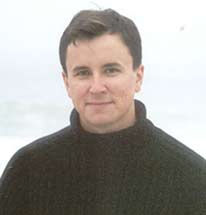 The
AMS Colloquium Lectures will be delivered by Andrei Okounkov,
Princeton University, on Friday, January 5, 2007 - Sunday, January
7, 2007 from 1:00 p.m. to 2:00 p.m. He will speak on Limit
shapes, real and imagined. The lectures will be held in
Grand Ballroom A, B, C, Sheraton New Orleans Hotel. The
AMS Colloquium Lectures will be delivered by Andrei Okounkov,
Princeton University, on Friday, January 5, 2007 - Sunday, January
7, 2007 from 1:00 p.m. to 2:00 p.m. He will speak on Limit
shapes, real and imagined. The lectures will be held in
Grand Ballroom A, B, C, Sheraton New Orleans Hotel.
Andrei Okounkov is a Professor of Mathematics
at Princeton University. He received his bachelor's degree in mathematics
in 1993 and his doctorate in mathematics in 1995 from Moscow State
University. He taught at the University of Chicago from 1996 to
1999 and at the University of California at Berkeley from 1998 to
2002.
Professor Okounkov has been a Research Fellow
in the Dobrushin Mathematical Laboratory at the Institute for Problems
of Information Transmission at the Russian Academy of Sciences and
a member of the Institute of Advanced Study in Princeton and of
the Mathematical Sciences Research Institute in Berkeley. He was
awarded a Sloan Research Fellowship in 2000, a Packard Fellowship
in 2001, and the European Mathematical Society Prize in 2004. He
was also awarded the Fields Medal in August, 2006 in recognition
of his work linking different fields of mathematics that had seemed
unrelated.
He works in representation theory, probability
theory, and algebraic geometry.
Efron to Speak on Baseball, Shakespeare, and Modern
Statistical Theory
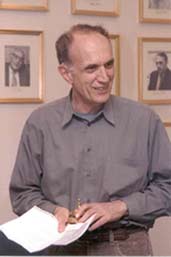 Bradley
Efron, Stanford University, will deliver an MAA Invited Address
on Friday January 5, 2007 from 3:40 p.m. to 4:30 p.m. He will speak
on Baseball, Shakespeare, and modern statistical theory.
The lecture will be held in Grand Ballroom A, B, C, Sheraton New
Orleans Hotel. Bradley
Efron, Stanford University, will deliver an MAA Invited Address
on Friday January 5, 2007 from 3:40 p.m. to 4:30 p.m. He will speak
on Baseball, Shakespeare, and modern statistical theory.
The lecture will be held in Grand Ballroom A, B, C, Sheraton New
Orleans Hotel.
Bradley Efron is Professor of Statistics and Biostatistics at Stanford
University. He works on a combination of theoretical and applied
topics, including empirical Bayes, survival analysis, exponential
families, bootstrap and jackknife methods and confidence intervals.
Most of his applied work has originated in biomedical consulting
projects at the Stanford Medical School, mixed in with a few papers
concerning astronomy and physics. Even his theoretical papers usually
begin with specific applied problems.
Professor Efron was born in St. Paul, Minnesota, May 1938, to Esther
and Miles Efron, Jewish-Russian immigrants. A Merit Scholarship,
in the program's inaugural year, brought him to Caltech, graduating
in Mathematics in 1960. He arrived at Stanford that Fall, eventually
gaining his Ph.D., under the direction of Rupert Miller and Herb
Solomon, in the Statistics Department, whose faculty also included
Charles Stein, Herman Chernoff, Manny Parzen, Lincoln Moses and
Ingram Olkin. Brad has lived at Stanford since 1960, with sabbaticals
at Harvard, Imperial College and Berkeley. He has held several administrative
positions at the university: Chair of Statistics, Associate Dean
of Science, Chairman of the University Advisory Board and Chair
of the Faculty Senate. He is currently Chair of the Undergraduate
Program in Applied Mathematics.
He has received numerous honors including doctorates from Chicago,
Madrid, and Oslo, a MacArthur Prize Fellowship, membership in the
National Academy of Sciences and the American Academy of Arts and
Sciences, fellowship in the IMS and ASA, the Wilks medal, Parzen
Prize, the newly inaugurated Rao Prize and the outstanding statistician
award from the Chicago ASA chapter. He has been the Rietz, Wald
and Fisher lecturers and holds the Max H. Stein endowed chair as
Professor of Humanities and Sciences at Stanford. Professional service
includes Theory and Methods editor of JASA, and President of both
the IMS and the ASA.
Wright to Speak on A Tale of Three Complexities:
The Worst of Times, the Best of Times, the Spring of Hope
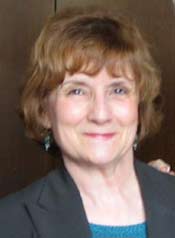 Margaret
H. Wright, New York University-Courant Institute, will deliver
an AMS Invited Address on Saturday January 6, 2007 from 3:20 p.m.
to 4:10 p.m. She will speak on A tale of three complexities:
The Worst of Times, the Best of Times, the Spring of Hope.
The lecture will be held in Grand Ballroom A, B, C, Sheraton New
Orleans Hotel. Margaret
H. Wright, New York University-Courant Institute, will deliver
an AMS Invited Address on Saturday January 6, 2007 from 3:20 p.m.
to 4:10 p.m. She will speak on A tale of three complexities:
The Worst of Times, the Best of Times, the Spring of Hope.
The lecture will be held in Grand Ballroom A, B, C, Sheraton New
Orleans Hotel.
Margaret H. Wright is Silver Professor of Computer Science and
Mathematics and chair of the Computer Science Department in the
Courant Institute of Mathematical Sciences, New York University.
She received her B.S. (Mathematics) and M.S. and Ph.D. (Computer
Science) from Stanford University. Prior to joining NYU, she was
a Distinguished Member of Technical Staff and Bell Labs Fellow at
Bell Laboratories, Lucent Technologies, and before that she held
a research position in the Department of Operations Research at
Stanford. Her research interests include continuous optimization,
linear algebra, scientific computing, and application of optimization
to real-world applications.
Professor Wright was elected to the National Academy of Engineering
in 1997, the American Academy of Arts and Sciences in 2001, and
the National Academy of Sciences in 2005. During 1995-1996 she served
as president of the Society for Industrial and Applied Mathematics
(SIAM).
She has chaired advisory committees for the Directorate of Mathematical
and Physical Sciences at the National Science Foundation and for
the Office of Advanced Scientific Computing Research at the Department
of Energy. She is currently a member of the scientific advisory
committees for the Radcliffe Institute for Advanced Study and for
``Matheon'' (the German Research Center on Mathematics for Key Technologies).
She serves on the Board of Governors for the Institute of Mathematics
and Its Applications at the University of Minnesota, and previously
served on the Scientific Advisory Committee and Board of Trustees
of the Mathematical Sciences Research Institute, Berkeley. In 2003,
she was a member of the International Review of Mathematics in the
United Kingdom. She is an associate editor of the SIAM Journal on
Optimization, the SIAM Journal on Scientific Computing, and Mathematical
Programming.
Haxell to speak on Forming
Committees
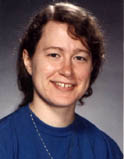 Penny
Haxell, University of Waterloo, will deliver an MAA Invited
Address on Friday January 5, 2007 from 2:15 p.m. to 3:05 p.m. She
will speak on Forming Committees. The lecture will
be held in Grand Ballroom A, B, C, Sheraton New Orleans Hotel. Penny
Haxell, University of Waterloo, will deliver an MAA Invited
Address on Friday January 5, 2007 from 2:15 p.m. to 3:05 p.m. She
will speak on Forming Committees. The lecture will
be held in Grand Ballroom A, B, C, Sheraton New Orleans Hotel.
Penny Haxell received her Ph.D. in pure mathematics
from the University of Cambridge in 1993. In the same year, she
joined the Department of Combinatorics and Optimization at the University
of Waterloo, becoming a full professor in 2004. She spent one year
as a visiting professor at Bell Laboratories in Murray Hill, NJ
in 2002. Her research interests focus on extremal combinatorics
and graph theory. From 1998 to 2005 she was a managing editor of
the Journal of Combinatorial Theory, Series B, and now serves on
the editorial board. In 2006 she received the Krieger-Nelson prize
of the Canadian Mathematical Society.
|
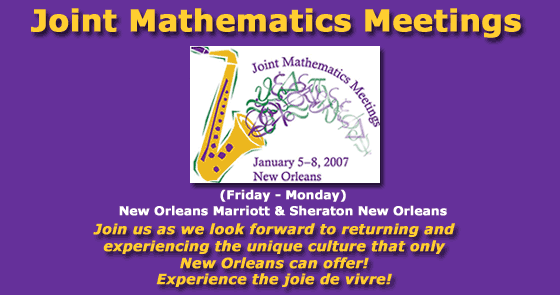
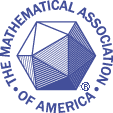

 Peter
D. Lax, New York University-Courant Institute, will deliver
the AMS Josiah Willard Gibbs Lecture on Friday January 5, 2007 from
8:30 p.m. to 9:30 p.m. He will speak on Mathematics and Physics.
The lecture will be held in Grand Ballroom A, B, C, Sheraton
New Orleans Hotel.
Peter
D. Lax, New York University-Courant Institute, will deliver
the AMS Josiah Willard Gibbs Lecture on Friday January 5, 2007 from
8:30 p.m. to 9:30 p.m. He will speak on Mathematics and Physics.
The lecture will be held in Grand Ballroom A, B, C, Sheraton
New Orleans Hotel. Jerry
L. Bona, University of Illinois
at Chicago, will deliver an MAA Invited Address on Monday January
8, 2007 from 10:05 a.m. to 10:55 a.m. He will speak on Big
waves in deep water. The lecture will be held in Grand Ballroom
A, B, C, Sheraton New Orleans Hotel.
Jerry
L. Bona, University of Illinois
at Chicago, will deliver an MAA Invited Address on Monday January
8, 2007 from 10:05 a.m. to 10:55 a.m. He will speak on Big
waves in deep water. The lecture will be held in Grand Ballroom
A, B, C, Sheraton New Orleans Hotel. The
AMS Colloquium Lectures will be delivered by Andrei Okounkov,
Princeton University, on Friday, January 5, 2007 - Sunday, January
7, 2007 from 1:00 p.m. to 2:00 p.m. He will speak on Limit
shapes, real and imagined. The lectures will be held in
Grand Ballroom A, B, C, Sheraton New Orleans Hotel.
The
AMS Colloquium Lectures will be delivered by Andrei Okounkov,
Princeton University, on Friday, January 5, 2007 - Sunday, January
7, 2007 from 1:00 p.m. to 2:00 p.m. He will speak on Limit
shapes, real and imagined. The lectures will be held in
Grand Ballroom A, B, C, Sheraton New Orleans Hotel. Bradley
Efron, Stanford University, will deliver an MAA Invited Address
on Friday January 5, 2007 from 3:40 p.m. to 4:30 p.m. He will speak
on Baseball, Shakespeare, and modern statistical theory.
The lecture will be held in Grand Ballroom A, B, C, Sheraton New
Orleans Hotel.
Bradley
Efron, Stanford University, will deliver an MAA Invited Address
on Friday January 5, 2007 from 3:40 p.m. to 4:30 p.m. He will speak
on Baseball, Shakespeare, and modern statistical theory.
The lecture will be held in Grand Ballroom A, B, C, Sheraton New
Orleans Hotel. Margaret
H. Wright, New York University-Courant Institute, will deliver
an AMS Invited Address on Saturday January 6, 2007 from 3:20 p.m.
to 4:10 p.m. She will speak on A tale of three complexities:
The Worst of Times, the Best of Times, the Spring of Hope.
The lecture will be held in Grand Ballroom A, B, C, Sheraton New
Orleans Hotel.
Margaret
H. Wright, New York University-Courant Institute, will deliver
an AMS Invited Address on Saturday January 6, 2007 from 3:20 p.m.
to 4:10 p.m. She will speak on A tale of three complexities:
The Worst of Times, the Best of Times, the Spring of Hope.
The lecture will be held in Grand Ballroom A, B, C, Sheraton New
Orleans Hotel. Penny
Haxell, University of Waterloo, will deliver an MAA Invited
Address on Friday January 5, 2007 from 2:15 p.m. to 3:05 p.m. She
will speak on Forming Committees. The lecture will
be held in Grand Ballroom A, B, C, Sheraton New Orleans Hotel.
Penny
Haxell, University of Waterloo, will deliver an MAA Invited
Address on Friday January 5, 2007 from 2:15 p.m. to 3:05 p.m. She
will speak on Forming Committees. The lecture will
be held in Grand Ballroom A, B, C, Sheraton New Orleans Hotel.



